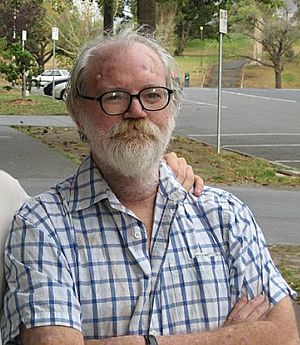Roger Cribb facts for kids
Quick facts for kids
Roger Cribb
|
|
|---|---|

Cribb in 2006
|
|
| Born |
Roger Llewellyn Dunmore Cribb
6 January 1948 |
| Died | 24 August 2007 (aged 59) |
| Region | Australian Archaeology |
| School | Processual archaeology |
|
Main interests
|
|
Roger Llewellyn Dunmore Cribb (born January 6, 1948 – died August 24, 2007) was an Australian archaeologist and anthropologist. He studied how nomadic people lived and moved. Nomadic people are groups who travel from place to place instead of settling in one spot.
Roger Cribb was known for his work with nomadic herders in Turkey. He also wrote a book about their ancient lives. He was a pioneer in using computers for archaeology in Australia. He used special computer programs to map areas and understand family histories. Later, he studied the lands of Aboriginal peoples in Cape York, Australia. He helped show how important their cultural sites were.
Contents
Discovering the Past: Roger Cribb's Work
Roger Cribb was a practical social scientist. He believed that studying how people lived in the past could help us understand ancient cultures. He focused on places like Turkey and Cape York, Australia. These areas have some of the world's oldest cultures. They are also very spread out.
Exploring Ancient Cultures
Dr. Cribb always tried to spend time with the people he studied. This is called ethnographic fieldwork. It means learning about their daily lives and traditions. He wanted to understand their heritage. He stored all his information in special computer databases.
Then, he used small computer programs to look at the data. These programs helped him find patterns in how people lived. They also showed how people organized their societies and used their environment. He would then test these ideas in the real world. He used them to understand how these cultures lived long ago.
How He Studied People
Later in his career, Dr. Cribb faced some challenges. He worked on his projects in Cape York without much academic support. From the 1990s, he worked more on projects outside of universities. These projects were often for businesses. Even though technology changed quickly, he kept working. He focused on the people and places he cared about most. He wanted to understand and share their cultural landscapes with the world.
Making a Difference
Dr. Cribb strongly disagreed with the idea of "terra nullius." This idea meant that land was "empty" or belonged to no one before Europeans arrived. He believed that ancient human heritage was deeply marked on these lands. He saw that these seemingly "empty" places were full of history.
Roger Cribb's most important work was fighting this idea. He recorded many ancient sites. He helped protect archaeological heritage. He showed how rich and vast the cultural landscapes were in Turkey and Australia. His work helped everyone see the deep history of these places.
Images for kids


